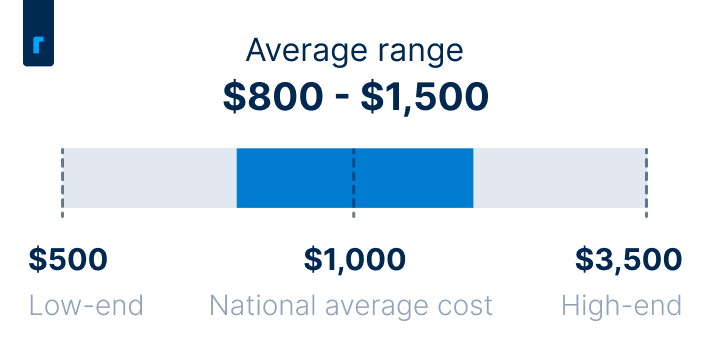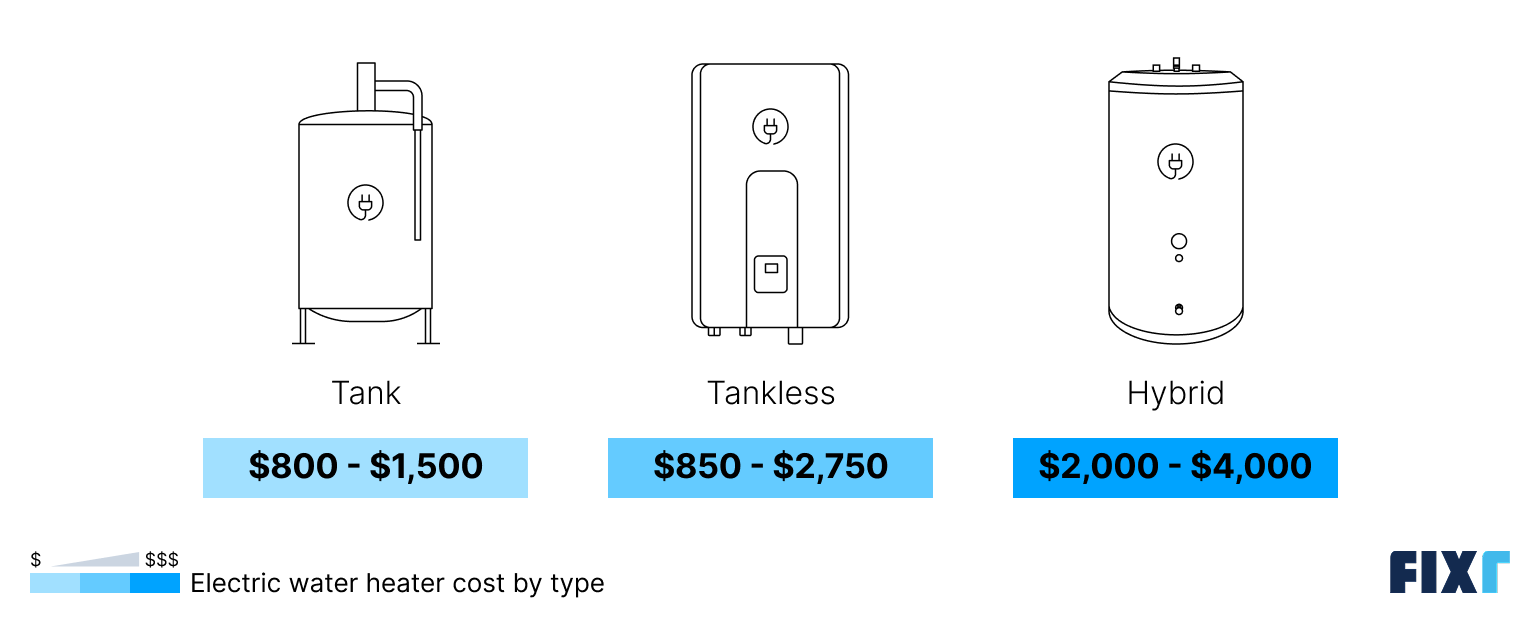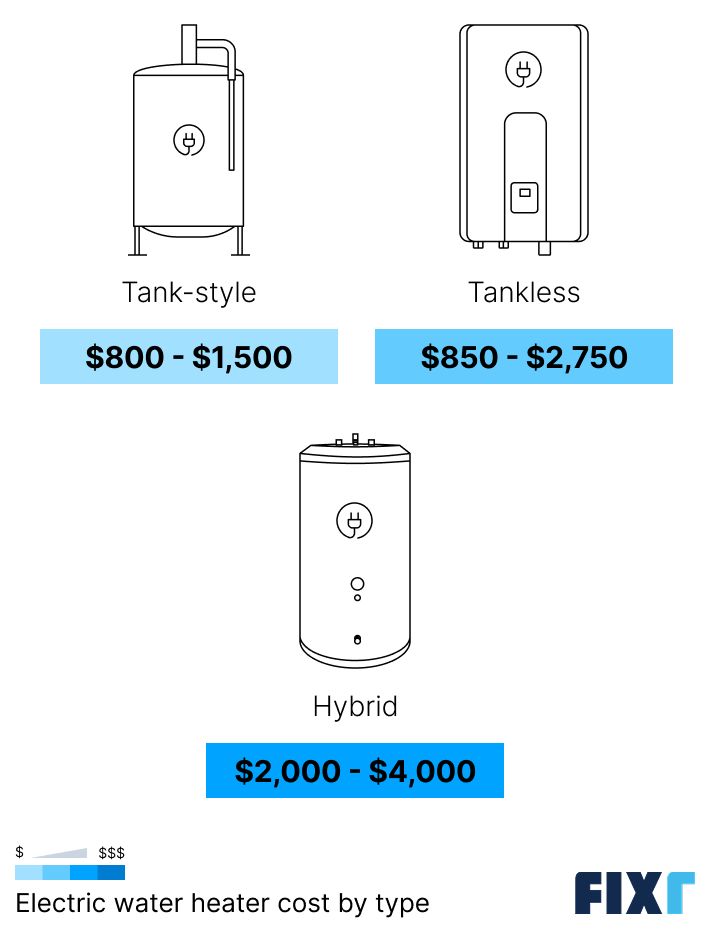Updated: January 27, 2026
Written by Dan Simms
Nieves Martinez is a writer and editor at Fixr.com, specializing in home improvement and construction content. With over five years of experience and a Master's degree in Digital Marketing, she collaborates with industry professionals to create clear, carefully reviewed cost guides and renovation resources that help homeowners make informed remodeling decisions.
Learn moreReviewed by Nieves Martinez
Electric water heater installation costs an average of $1,000, and most installations total between $800 and $1,500. You could pay as little as $500 or as much as $3,500, depending on the complexity of the installation, the type of water heater, the capacity, the efficiency, and what fuel type your current water heater uses.
Electric water heaters are popular for homeowners looking to reduce their carbon footprint, as they don’t directly burn fossil fuels to heat water. While they’re often more affordable to install than other types because they don’t require fuel lines, the total installation cost can vary significantly, especially if your home's existing electrical system needs upgrades to support a new unit. Whether you're replacing an old unit or considering a conversion, this guide breaks down all the costs you can expect. The complexity of the installation, along with the size and efficiency, will affect the total cost.
Electric Water Heater Installation Cost


Cost of Electric Water Heater by Type
There are three types of electric water heaters for your home. The most common is a tank-style electric water heater, which uses electric heating elements to store and maintain a reservoir of hot water. These models are well-suited for whole-home applications, ensuring a steady supply of hot water for typical daily use. Tank-style electric water heaters cost between $800 and $1,500, including materials and labor.
For on-demand hot water, homeowners can opt for tankless electric water heaters. These models for whole-home applications do exist, but due to their high electrical demand, achieving a suitable gallons-per-minute (GPM) rating for larger homes often makes them an impractical choice. More often, tankless electric water heaters are suitable for individual rooms or even individual fixtures. They cost between $850 and $2,750, on average, for materials and labor. They have minimal maintenance requirements and can significantly improve home energy efficiency, which may lead to reduced utility bills, which is why they’re popular.
A hybrid water heater, also known as a heat pump water heater, uses an electric heat pump to heat water in a tank, but it can also use electric resistance elements backup when demand gets high. These units are popular solutions for their high energy efficiency, as the electric heat pump can significantly lower utility bills. Hybrid electric water heaters cost between $2,000 and $4,000 to install.


Type | Cost |
Tank | $800 - $1,500 |
Tankless | $850 - $2,750 |
Hybrid | $2,000 - $4,000 |
Electric Tank Water Heater Cost by Size
If you go with an electric tank water heater, the tank size you go with can play a major role in your material costs. Most tank-style water heaters have capacities between 30 and 80 gallons, with larger tanks holding more hot water in reserve to meet higher demand. However, electric water heaters only go up to 50 gallons of water for residential use.
Installing a new water heater that’s too small will mean cold showers and running out of hot water when washing clothes and dishes. It will also work constantly to keep up with demand, leading to a shorter lifespan. A water heater that’s too big will mean keeping an unnecessarily large volume of water hot at all times, which wastes energy and needlessly increases your electric bills.
You can use the table below to get an idea of what size water heater you need and what it will cost you. However, you should have a professional determine your size, as they’ll consider everything from your climate and real-time demand to expected energy losses as your water travels through your pipes.
Size (in Gallons) | Household Size (People) | Cost |
30 | 1 - 2 | $600 - $1,000 |
40 | 1 - 4 | $700 - $1,650 |
50 | 3 - 5 | $700 - $1,900 |
Labor Cost to Install Electric Water Heater
The labor cost of installation for an electric water heater will sit between $150 and $450 for tank-style water heaters, while electric tankless water heater installation costs between $600 and $1,900. On average, labor will make up between 25% and 50% of your total, depending on the type of water heater you choose and the job complexity.
Labor costs usually include removing your old water heater, installing or mounting the new one, and making any necessary changes to the water lines and electrical connections to fit your new unit. Licensed plumbers should handle the unit installation and plumbing connections, and a licensed electrician should make any necessary changes or upgrades to your electrical connection.
Average Cost of Electric Water Heater per Month
The cost to run an electric water heater depends on the energy efficiency of the unit you install, the size of the unit, the demand for hot water in your home, and your local electricity rates. As an example, the cost of a 50-gallon water heater averages $57.59 per month to operate. This assumes your unit has a power rating of 5,500 watts and runs for 2 hours a day, and that you pay the national average cost per kWh for electricity of 17.45 cents.
You can use this water heater running cost calculator from the Department of Energy to get a better idea of what your electric water heater will cost you per month, based on equipment specifications and your household habits. Be sure to use the average cost of electricity in your area for the most accurate estimate.
Gas vs. Electric Water Heater Monthly Cost
If you’re considering converting from a gas-fired water heater (the most common type) to an electric water heater, you should be prepared to pay more in energy costs. On average, you’ll pay around $60 per month to run an electric water heater, while a gas water heater costs closer to $30 per month. While gas water heaters are cheaper to run in most cases, they’re less sustainable since they burn fossil fuels directly, they’re more dangerous because of the risk of gas leaks and carbon monoxide, and they require more maintenance.
Cost to Convert Gas Water Heater to Electric
Converting from a gas-fired water heater to an electric water heater requires some additional work as compared to replacing your water heater with the same type.
You’ll need to install a dedicated 240-volt outlet to support the higher power draw, which will cost between $140 and $300 in most cases, although the total can reach higher, depending on how far you need to run new wiring. You’ll also need to cap your old gas line, which will cost between $75 and $175, and install a dedicated circuit breaker, which costs between $400 and $2,000. Expect to add between $700 and $2,500, on average, to convert from gas to electric.
Despite the higher cost to convert, this is a popular option because of the increased safety, fewer dangerous emissions, and reduced water heater maintenance costs.
Additional Cost Factors
There are a few important cost factors you should consider that can influence your electric water heater installation costs. Think about how each of these will play into your installation costs to get the most accurate estimate possible.
Electrical System Requirements
Older homes with 100-amp electrical service may not be able to support an additional 240-volt outlet, which is required for an electric water heater. Upgrading to 200-amp service can add $1,200 to $3,000 to your total. Even if you have the proper service, you may need to add a sub-panel to support the additional load, which will add between $400 and $2,000 to your installation costs.
Installation Difficulty
Remember that labor can account for up to 50% of your total, so anything that complicates the installation can add significantly to your cost. Maneuvering equipment and tools into and out of cramped crawlspaces, for example, may lead to higher labor costs, as might conversions far from existing electrical connections.
Energy Efficiency Options
Just like with all other appliances, electric water heaters come with different energy efficiency ratings. For electric water heaters, the uniform energy factor (UEF or just EF) tells you how efficient your model is. ENERGY STAR-rated electric water heaters have EF ratings of 3.30 or higher. These units will cost more upfront, but they can save an average of $600 per year more than a standard electric water heater for a family of four. This is one of the many home improvement projects that can significantly impact your energy savings.
Safety Features
Some electric water heaters come with safety features, including smart leak detection and automatic shut-off. Units with these features will cost a bit more, on average, but they save you from expensive water damage if you run into a problem.
Permits
Replacing a water heater will usually require permits, and these come with fees ranging from $25 up to $300, in most cases. The total depends on your local municipality and the fee schedule your building uses. Prices can climb as high as $1,500, especially if you need multiple permits to alter your plumbing system, install the water heater, and make changes to available electrical connections. These fees are part of the additional costs you should budget for.
Signs You Need to Replace Your Electric Water Heater
If you already have an electric water heater installed, there are a few signs to look out for that suggest it’s time to replace it. The most obvious signs include an unusual increase in your energy bills, which signifies that your system is struggling to keep up with demand; insufficient hot water, which could mean your system is failing or has lost efficiency over time; or visible leaks or pooling water around the unit’s base.
You may also notice other issues, including clinking noises during operation, foul odors, or discoloration in your water, which all suggest problems with hard water deposits or corrosion inside your unit. Finally, if your electric water heater is reaching the end of its expected lifespan, get ahead of issues by replacing it early. Tank-style water heaters last for 8 to 12 years, while tankless water heaters last for 15 to 20 years.
DIY vs. Professional Installation
With labor accounting for up to $1,900 for electric water heater installation, it’s probably tempting to consider a DIY installation. While it is technically possible to do, it involves both plumbing and electrical work, which are risky to do on their own but potentially deadly when combined. Mistakes can also lead to expensive water damage and electrical fires, and product warranties are usually voided if you DIY the work. Homeowner’s insurance policies likely won’t cover damages, either, since you’re responsible for the issue.
Hiring a professional will keep you and your home safe from harm and will also leave you with a properly-sized water heater that will provide good efficiency and meet your hot water demands. Professionally installed units are also less likely to leak or lead to electrical problems. In case that wasn’t enough to convince you to hire a pro, most municipalities don’t even allow DIY plumbing and electrical work, so you’ll have to hire an expert for legal reasons.
How to Save on Electric Water Heater Costs & Benefits of Replacement
Luckily, there are other ways to save on your electric water heater replacement costs aside from DIYing. First, be sure to size your water heater properly to avoid wasting energy and paying unnecessarily high utility costs. Get at least three quotes and compare based on cost and value, and consider timing your actual installation during the off-season for lower labor costs. You can also check the Database of State Incentives for Renewables and Efficiency (DSIRE) for tax credits, rebates, and other incentives available in your area for choosing a high-efficiency unit.
Opting for a more efficient, ENERGY STAR-certified electric water heater is more costly upfront but saves an average of $600 per year compared to a standard model, so it’s worth it in the long run. More efficient water heaters also won’t have to work as hard to meet your hot water demands, which means they could last longer than lower-efficiency models and be more reliable in the meantime.
FAQs
The main downside to an electric tankless water heater is that they don’t come with high enough gallons-per-minute (GPM) ratings to support an entire home. If you want tankless electric water heaters, you’ll likely need to install multiple units to support your home, unless you live in a small apartment or condo and have low hot water demands.
The average cost to run an electric water heater is around $60 per month, which comes out to $720 per year. This is around twice as expensive as it is to run a gas water heater, but you’ll enjoy lower maintenance costs, a smaller carbon footprint, and improved safety due to a lack of combustion, no risk of gas leaks, and no risk of harmful emissions.
A tank-style electric water heater has an installation price between $800 and $1,500. An electric tankless water heater costs between $850 and $2,750 including installation. Tankless units have a limited capacity and will serve just a single fixture or an individual room, which is why the units are more affordable.
It’s about twice as expensive to run an electric water heater as it is to run a natural gas water heater, and it can get even more expensive if you live in an area with above-average electricity rates. Electric water heaters are more sustainable, though, and there’s no risk of a gas leak or toxic emissions.
A 50-gallon, tank-style electric water heater will use an average of between 300 and 400 kWh of electricity per month or 3,600 to 4,800 kWh per year. For comparison, a modern refrigerator will use between 300 and 800 kWh per year. Electric water heaters do use a lot of electricity, but they’re more efficient and sustainable than other types, and they’re safer to operate due to the lack of combustion.
Yes. A gas-powered water heater can set off a carbon monoxide detector if it malfunctions or vents improperly. Common causes include a blocked flue, backdrafting, or a cracked heat exchanger. If a CO alarm sounds, leave the home immediately and contact emergency services or a licensed professional.
